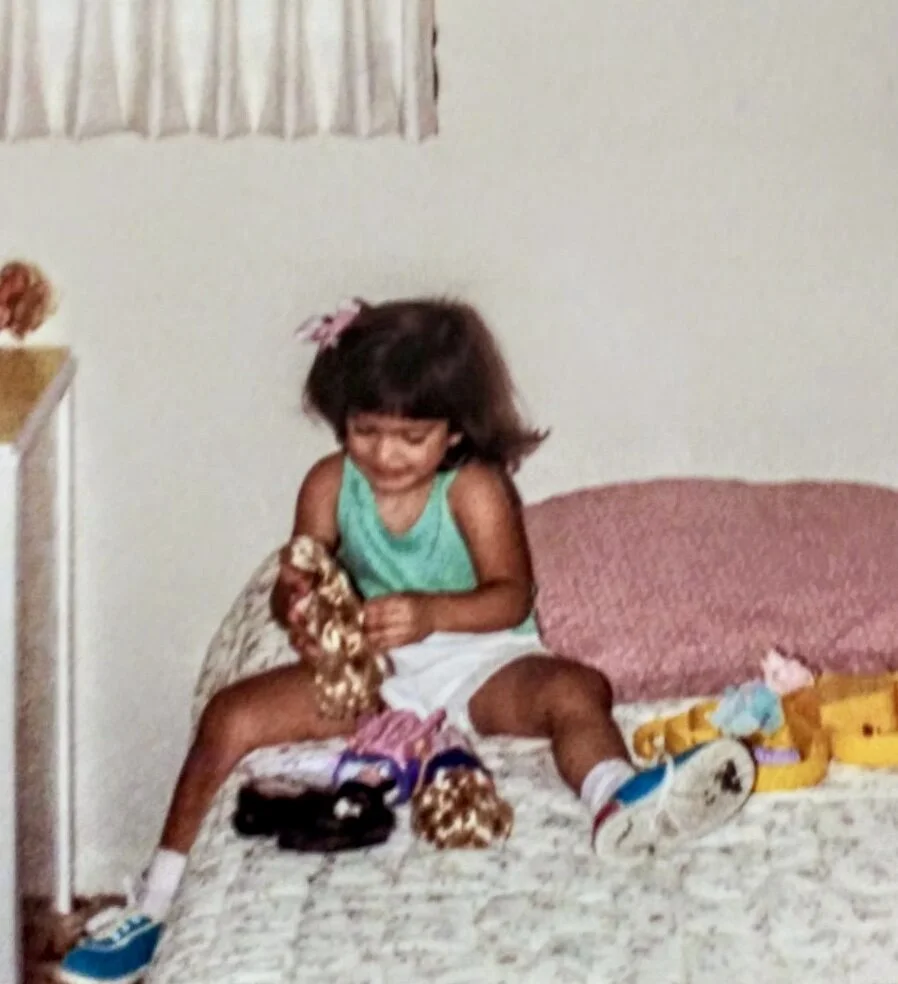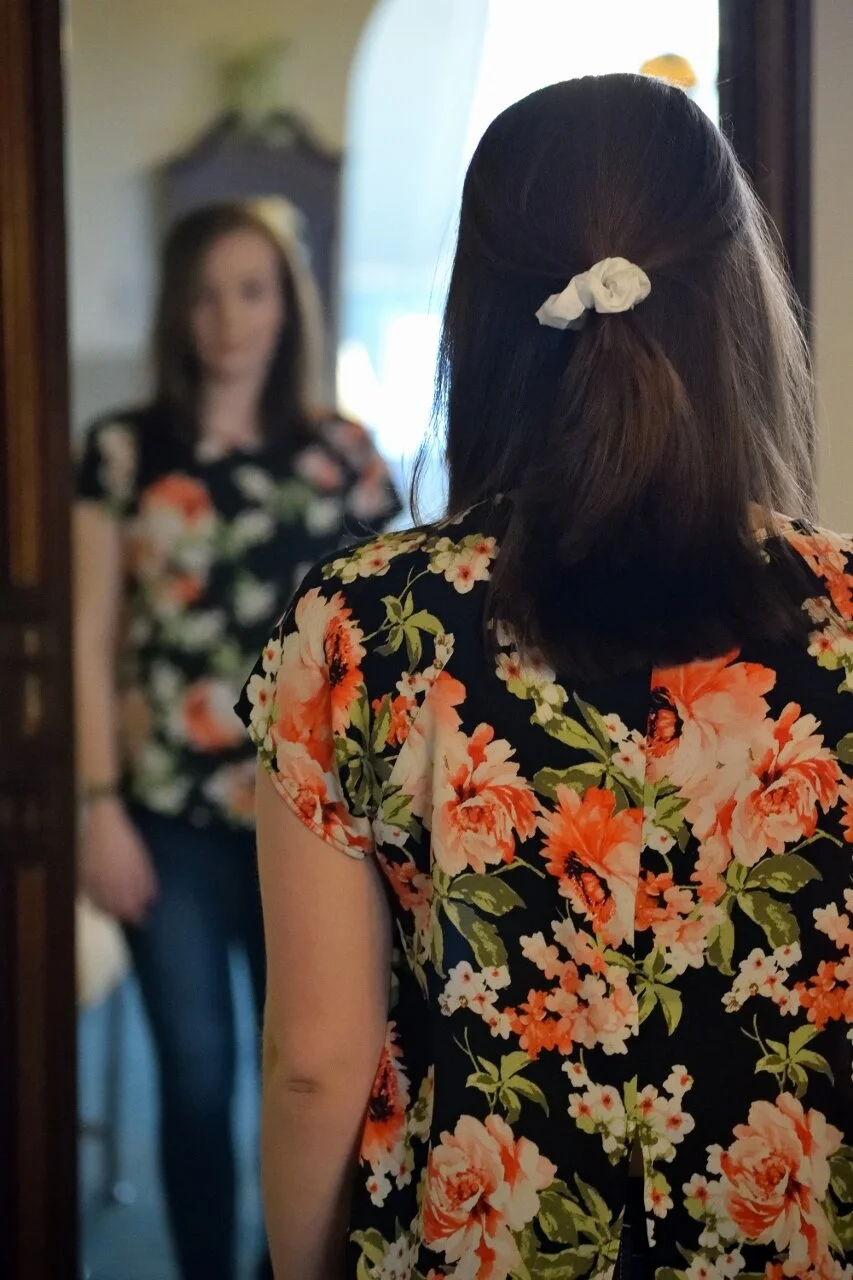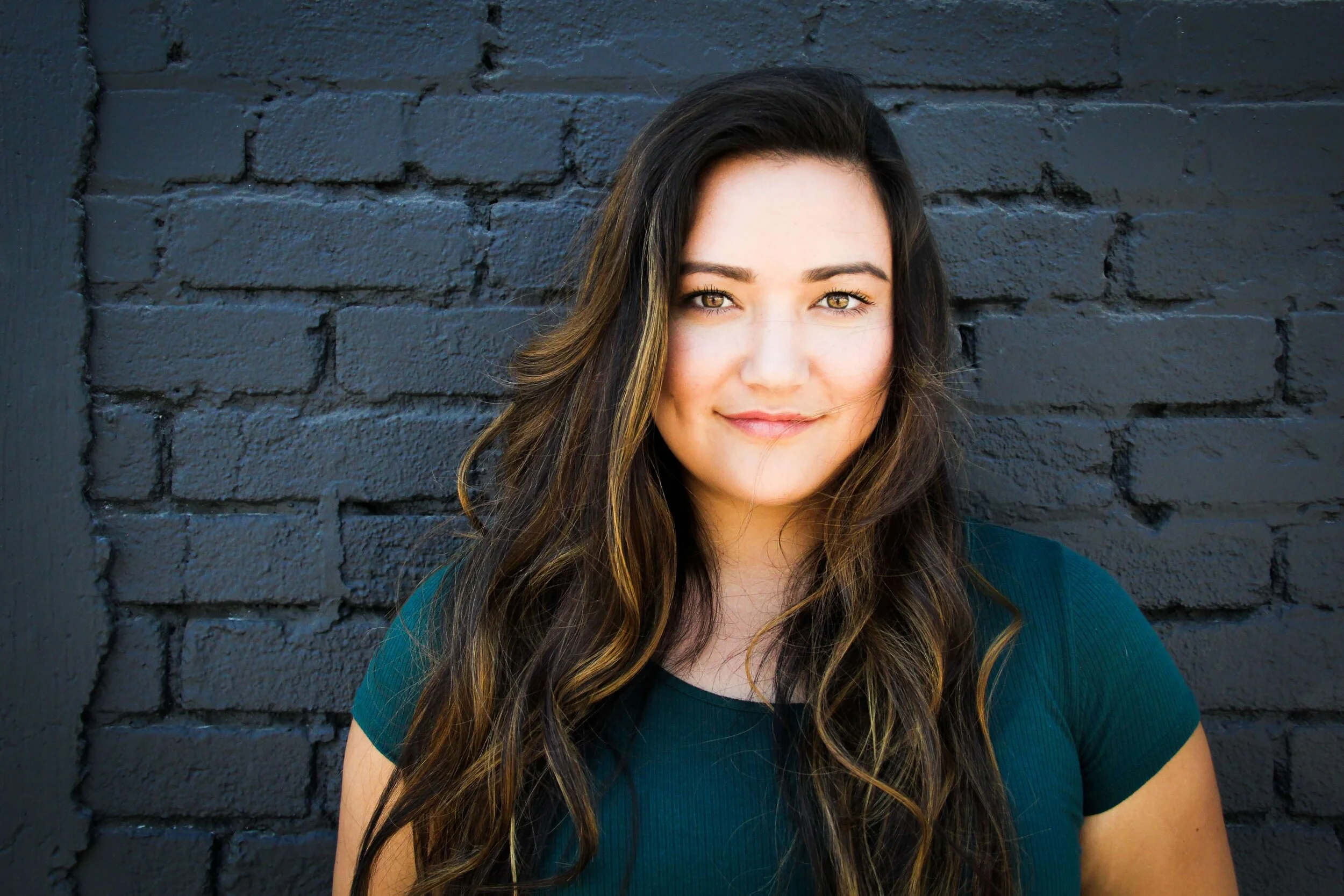Why You Really Can’t Lose Weight
Barbie was my favorite toy growing up. I was obsessed with her, loved dressing her, and idolized her perfect “10” body… especially her legs.
This may explain why I spent most of my childhood, adolescence, teenager-hood, and young adulthood feeling SUPER self-conscious about my own legs. I spent entire years, at a time, refusing to wear shorts because I hated the appearance of my legs, much shorter, more muscular, and with wider kneecaps than Barbie.
Me playing with my favorite toy, Barbie dolls, at a young age.
While I l loved my dolls, Barbie contributed to my poor body image and unrealistic expectations for what my body could look like.
The Problem Isn’t That You Can’t Lose Weight
In the work that I do, I am equipped with the important task of helping people identify the root, the heart, or, as a mentor of mine says, “the problem’s problem” of what a person may think ails them as it relates to their weight, food relationship, diet, and such.
One of the most common complaints I hear is, “I can’t lose weight,” or “Nothing I do is working.” Often, when I dig deeper to uncover the heart of the matter, I discover that the “problem’s problem” is actually “I am unhappy with my body.”
You Really Hate Your Body
Have you ever adopted an eating or exercise plan only to abandon it when you felt discouraged that you weren’t getting the slim arms you always dreamed of, your abs weren’t turning into a six-pack, or your hips still looked wide?
I have met many people who adopt a healthier eating plan to target a specific area (or areas of their body) unaware that their body’s unique structure may prevent the results they desire.
For some people, perceived struggles with weight stem from misunderstanding their body type and not from their inability to lose weight.
Most of us are guilty of trying to look like someone we saw on the cover of a magazine, but for many of us, these desires feed an often hidden self-hatred of the body we see in the mirror.
A mentor of mine hosts events where thousands of women attend. She often describes a moment, during an exercise at her event, where almost every woman in the room stood up to agree that they “hated” their body.
If you think body hatred only plagues females, you are wrong. A quick search online, reveals that 20-40 percent of men surveyed admit to experiencing body image issues.
For my clients who struggle with “hating” their body, otherwise known as poor body image, I recommend working on three perspective shift exercises.
Exercise #1: Understand Your Body Type
I learned to surrender and to stop holding on to false expectations that my body would ever look like anything other than my body!
On a podcast episode I recently listened to Angela Garcia, an accomplished personal trainer, holistic gym owner, and cultural shifter put it well when she expressed, “If you lose weight and you change your body composition, your beautiful pear is going to become a smaller “pear.” She referred to the “pear” body type, a body type where a woman is fuller in the hips and thighs and smaller in the waist, torso, and upper body. Her words were in response to a client who wanted to change her hip size in a way she could not change due to her body type.
I have experienced similar sentiments. I have spent hours of my life, maybe days, feeling like life was unfair because my body didn’t look as long, lean, smooth, or small as someone else’s despite eating healthier, working out more, and trying lots of time-consuming “at home” remedies to overcome my problem areas.
Can you relate?
Fortunately, my story, as it relates to body image, didn’t stop there. Over several years, my perception about my body shifted, and I grew to love, appreciate, and more deeply understand my body type.
One pivotal part of my journey began a few years after I completely cleaned up my diet and adopted a regular, rigorous workout regimen. I realized that I was doing the best with what I had, but my body still gave me problems in the “problem areas.” Lifting weights and eating an anti-inflammation diet changed my body composition some, but the “old Claudia” would have still found plenty to hate.
Facing this reality head on, I learned to surrender and to stop holding on to false expectations that my body would ever look like anything other than my body!
Application: Do you know your body type? Perhaps it is time to be honest with yourself. Even if you slimmed down, ate all the right foods consistently, and worked out regularly, where would you still hold weight, look muscular, be straight rather than curvy, curvy rather than flat, have stretch marks, or fail to develop super ripped muscles?
Take some time to reflect on what you can and can’t change about your body. Then, spend more time becoming comfortable and gradually accepting what is and is not in your control to accomplish in a healthy manner, in terms of your body type.
You may feel disappointed at first, but knowing what you are working with, can empower you to stop trying to look like someone else when you can only look like you!
Exercise #2: Celebrate Your Best Assets
Isn’t it funny, how we can tell someone who sees us every day about our broad shoulders, prominent ears, crooked toes, and short torso… and they have no idea what we are talking about? We are ready to voice all our “flaws” at any given moment, but we are the only people who see them as such.
A pivotal part of accepting and loving my body was learning to identify and celebrate my best assets. People say nice things about you if you listen and, by listening to people, I learned that I had nice eyelashes, good “glowy” skin, and a nice derriere, in jeans.
I never would have pointed out these things about myself! I thought my lashes were too straight, I never thought twice about my skin, and I was too concerned with how I looked in a swimsuit to compliment myself in a pair of jeans.
But over the years, I embraced these characteristics as my best assets. I walked into rooms proudly, feeling good about how my bottom half looked. When speaking to people face to face, I chose to believe that my eye lashes accentuated my face. I regularly express, in a non-braggy way, that I have good skin, as factually as I would say birds fly.
I could allow myself to succumb to dissatisfaction about my appearance, but I don’t dwell on things I dislike about my appearance or give negative voices, about my image, any ground.
Application: Reflect on your best assets. Remind yourself of what you like about yourself, what someone has said they like about you, or discover your best assets for the first time! If this is the first time for you (or the first time in a long time), turn off your critical voice and find your best features. Hint: There is always a best, so you must come up with something!
If identifying your best assets is difficult for you, find a compassionate person who loves you or a kind person at work, church, or elsewhere and explain that you need help identifying your best assets so you can develop a healthier image of yourself. Allow the loved one or kind person to help you identify your best assets.
Next time you walk into a room, and any time after that, imagine that everyone is noticing your best assets. Overtime, you will begin to naturally focus more on your best assets and less on everything you could hate about your appearance.
When you embrace your best assets and the unique gifts and traits you bring to the world, your perception of your body image will change and other people will see your worth radiating out of you.
Exercise #3: Embrace Your Worth Outside of How You Look
Embracing my worth, independently from my image, was the most difficult and most recent development in my journey towards developing a healthier body image.
I grew up watching beauty pageants where women seemed to be judged solely on their appearance. The cultural norm in my family, though loving and well intentioned, was to comment on someone’s appearance, even their weight, as the first thing you said to them.
For more than fifteen years of romantic relationships, I didn’t realize how much my perception of my self-worth was tied to my image. Even though I believed in my other qualities, I believed that I needed to offer a near perfect appearance to be worthy enough to be in relationship with.
I know now that I was dramatically wrong, but I didn’t begin to realize my mistaken beliefs until a few years ago.
Dating, and later marrying, my husband surfaced feelings of unworthiness, at first. My husband did not say much about my physical appearance, and, at first, this made me feel extremely self-conscious because I believed he couldn’t see my worth. Later, after many conversations and observations and lots of experience, I realized that my husband saw far beyond my physical appearance. I knew that he found me very attractive, but my other qualities were much more important to him than how I looked.
Realizing how my husband felt about me, cast a light, for the first time in my life, at how much my sense of personal value was tied to my physical appearance (and how ridiculous it was). Since then, I have allowed myself to release my physical appearance as a measure of my worth and embrace my worth just for existing.
Application: Reflect on your own beliefs about your worth and image. If you experience feelings of unworthiness because of how you look, I need you to realize what I realized just a few years ago… this is totally ridiculous! How you look has no bearing on your worth! I know that some people will treat you as if your worth is dependent on how pretty, tall, or fit you are, but when you think about it, the people that treat others poorly because of their physical appearance, are usually the ugliest, most hollow, and most misguided of people. You don’t need their approval, and trust me, you don’t want it either!
When you step into your own worth as a human being, and the unique gifts and traits you bring to the world, other people will see your worth more easily as well!
Conclusion
In summary, I would like to iterate that there are many legitimate reasons people struggle with losing weight, and not everyone who struggles with losing weight, suffers from body dissatisfaction and self-worth issues. However, in my professional experience, many who complain to me that they can’t lose weight, struggle more deeply with dissatisfaction about their body.
As a trained and determined nutritionist, I can help almost anyone carrying extra body fat, lean down a in a healthy way, if they follow my advice. However, I cannot change their body type. If you struggle with poor body image, practice my three perspective shift exercises… your perspective about your body is something we can change!
As always, I hope that reading my blog post today helps you progress your food relationship forward so that you can live the healthy, happy, optimal life I know you desire, so, feel free to contact me to chat about what is on your mind, about your relationship to food!
Also, don’t forget to take my free food relationship quiz to check up on your food relationship and see what areas of your food relationship need a little work.




